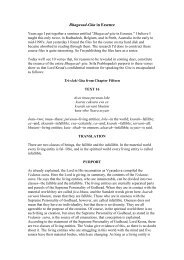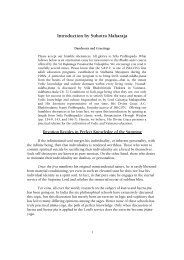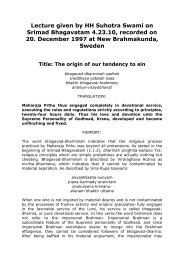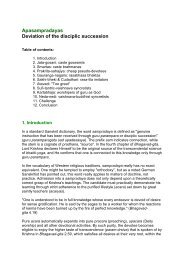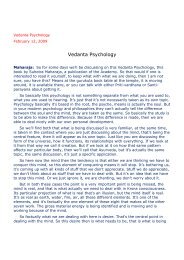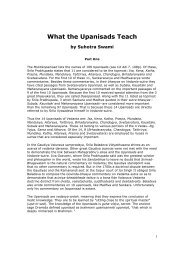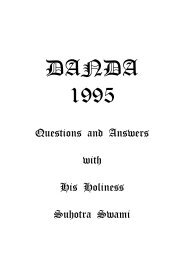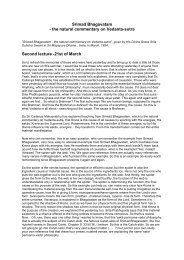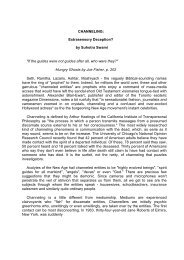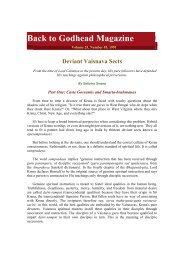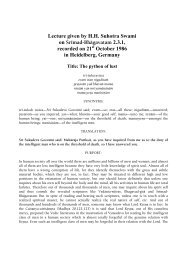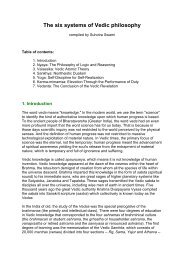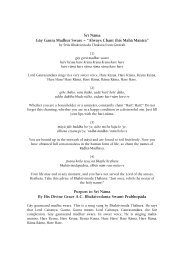artho 'yam brahma-sutranam - Suhotra Maharaja Archives
artho 'yam brahma-sutranam - Suhotra Maharaja Archives
artho 'yam brahma-sutranam - Suhotra Maharaja Archives
You also want an ePaper? Increase the reach of your titles
YUMPU automatically turns print PDFs into web optimized ePapers that Google loves.
philosophy. In this connection the Srimad-Bhnavatam states:<br />
aho bata svapaco'to gariyn<br />
yajjih vnre vartate nma tubhyam<br />
tepus tapas te juhuvuh sasnur arya<br />
<strong>brahma</strong>n ucur nama grnanti ye te<br />
"If a person born in a family of dog-eaters takes to the<br />
chanting of the holy name of Krsna, it is to be understood that<br />
in his previous life he must have executed all kinds of<br />
austerities and penances and performed all the Vedic yajnas."<br />
(SB. 3.33.7 ) Another quotation states:<br />
rg-vedo 'tha yajur-vedah sma-vedo 'py atharvanah<br />
adhitas tena yenoktam harir ity aksara-dvayam<br />
"A person who chants the two syllables Ha-ri has already<br />
studied the four Vedas--Sama, Rk, Yajuh and Atharva."<br />
Taking advantage of these verses, there are some sahajiys who,<br />
taking everything very cheaply, consider themselves elevated<br />
Vaisnavas but do not care even to touch the Vednta-sutras or<br />
Vedanta philosophy. A real Vaisnava should, however, study<br />
Vedanta philosophy, but if after studying Vedanta one does not<br />
adopt the chanting of the holy name of the Lord, he is no<br />
better than a Mayavadi. Therefore, one should not be a<br />
Mayavadi, yet one should not be unaware of the subject matter<br />
of Vedanta philosophy. Indeed, Caitanya Mahaprabhu exhibited<br />
His knowledge of Vedanta in His discourses with Prakasananda<br />
Sarasvati. Thus it is to be understood that a Vaisnava should<br />
be completely conversant with Vedanta philosophy, yet he should<br />
not think that studying Vedanta is all in all and therefore be<br />
unattached to the chanting of the holy name. A devotee must<br />
know the importance of simultaneously understanding Vedanta<br />
philosophy and chanting the holy names. If by studying Vedanta<br />
one becomes an impersonalist, he has not been able to<br />
understand Vedanta. This is confirmed in Bhagavad-gita (Bg.<br />
15.15). Vedanta means "the end of knowledge." The ultimate end<br />
of knowledge is knowledge of Krsna, who is identical with His<br />
holy name. Cheap Vaisnavas (sahajiyas) do not care to study<br />
the Vedanta philosophy as commented upon by the four acaryas.<br />
In the Gaudiya-sampradaya there is a Vedanta commentary called<br />
the Govinda-bhasya, but the sahajiyas consider such<br />
commentaries to be untouchable philosophical speculation, and<br />
they consider the acaryas to be mixed devotees. Thus they clear<br />
their way to hell.'<br />
C. From Caitanya-caritamrta, Adi-lila, Chapter 7, Text 102,<br />
Purport: 'The Mayavadi sannyasis, appreciating Lord Caitanya<br />
Mahaprabhu, inquired from Him why He did not discuss Vedanta<br />
philosophy. Actually, however, the entire system of Vaisnava<br />
activities is based on Vedanta philosophy. Vaisnavas do not<br />
neglect Vedanta, but they do not care to understand Vedanta on<br />
the basis of the Sariraka-bhasya commentary. Therefore, to<br />
clarify the situation, Lord Sri Caitanya Mahaprabhu, with the<br />
permission of the Mayavadi sannyasis, wanted to speak regarding<br />
Vedanta philosophy. The Vaisnavas are by far the greatest<br />
philosophers in the world, and the greatest among them was<br />
Srila Jiva Gosvami Prabhu, whose philosophy was again presented<br />
less than four hundred years later by Srila Bhaktisiddhanta<br />
Sarasvati Thakura <strong>Maharaja</strong>. Therefore one must know very well<br />
that Vaisnava philosophers are not sentimentalists or cheap<br />
devotees like the sahajiyas. All the Vaisnava acaryas were<br />
vastly learned scholars who understood Vedanta philosophy<br />
fully, for unless one knows Vedanta philosophy he cannot be an<br />
acarya. To be accepted as an acarya among Indian<br />
transcendentalists who follow the Vedic principles, one must<br />
become a vastly learned scholar in Vedanta philosophy, either<br />
by studying it or hearing it.



